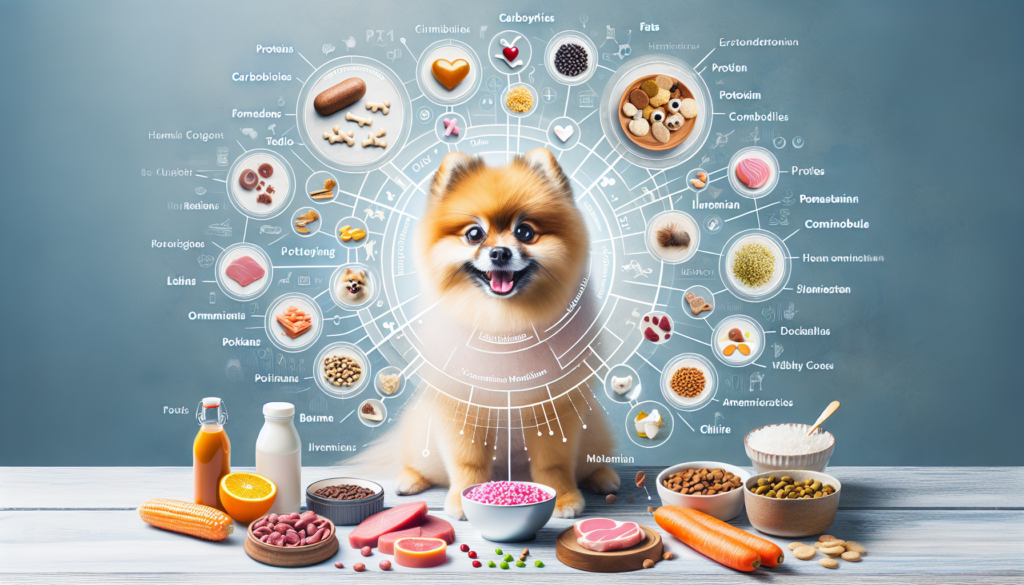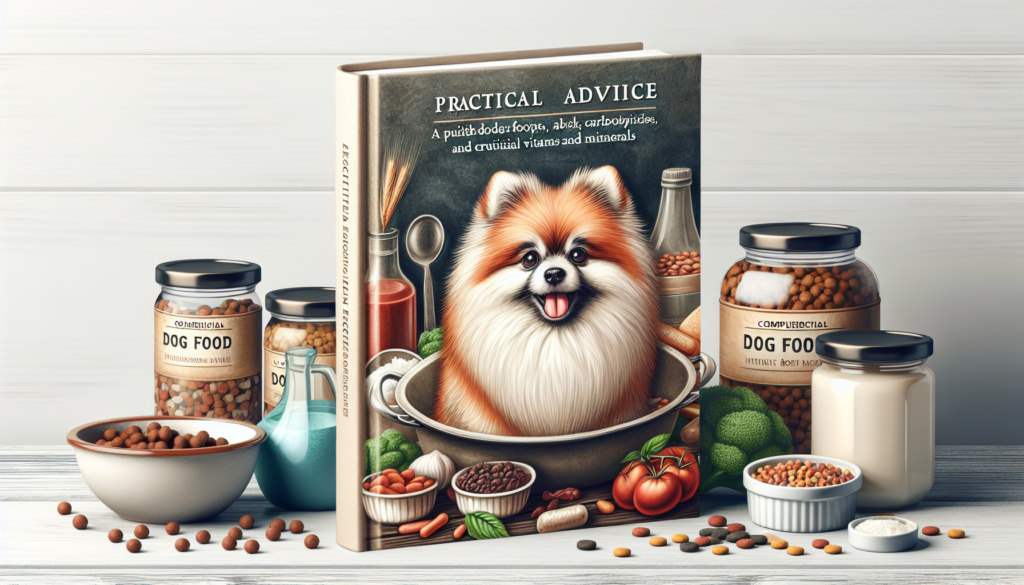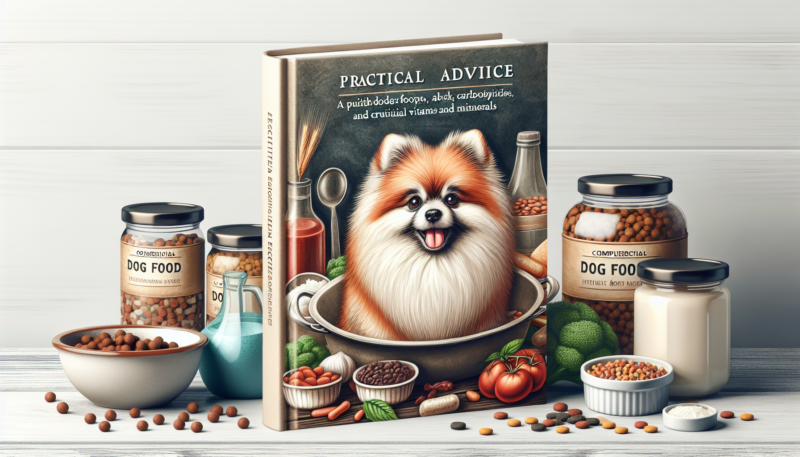If you’re a proud owner of a Pomeranian, you know how important it is to keep your furry friend healthy and happy. But when it comes to their diet, it can be overwhelming to know what’s best for them. That’s why we’ve got you covered with this article on “The Best Diet for Pomeranians.” We’ll explore different nutritional needs and provide valuable tips to ensure your Pomeranian thrives on a diet tailored just for them. So get ready to discover the ideal diet to keep your Pomeranian full of energy and wagging their tail with delight!

The Best Diet for Pomeranians
Pomeranians are delightful little dogs that bring joy and companionship to our lives. As a responsible pet owner, it’s essential to provide them with a well-balanced and nutritious diet to ensure their overall health and well-being. In this article, we will explore the various aspects of a Pomeranian’s diet, including choosing the right food, nutritional requirements, recommended dog food brands, feeding schedules, proper hydration, snacks and treats, dietary considerations, potential benefits of homemade diets, and the importance of consulting with a veterinarian.
Choosing the Right Food for Pomeranians
Choosing the right food for your Pomeranian can be overwhelming with the countless options available in the market. It’s essential to select a high-quality dog food that meets their specific nutritional needs. Look for dog food brands that provide a well-balanced and complete diet, specifically formulated for small breed dogs. These formulas are designed to provide the necessary nutrients in the right proportions, taking into consideration the unique requirements of Pomeranians.
Factors to Consider in Pomeranian’s Diet
When considering your Pomeranian’s diet, there are several factors to take into account. Age, activity level, and any existing health conditions should all be considered when selecting the appropriate food for your furry friend. Puppies, adult Pomeranians, and senior dogs have different nutritional needs, so it’s important to choose a diet that is tailored to their life stage. Additionally, if your Pomeranian has any allergies or sensitivities, you’ll need to choose a diet that avoids common allergens.
Commercial Dog Food vs. Homemade Diet for Pomeranians
The choice between commercial dog food and a homemade diet is a matter of personal preference for many pet owners. Both options have their Pros and Cons, so it’s important to evaluate them carefully. Commercial dog food offers convenience and typically meets all the necessary nutritional requirements. On the other hand, homemade diets allow for more control over the ingredients and can be tailored to specific dietary needs. However, it’s crucial to ensure that homemade diets are nutritionally balanced and meet all the essential requirements.
Nutritional Requirements for Pomeranians
To maintain optimal health, Pomeranians require a well-balanced diet that meets their specific nutritional needs. Let’s take a closer look at the essential nutrients that should be included in their diet.
Protein
Protein is a crucial component of a Pomeranian’s diet, as it provides the building blocks for healthy muscle development and repair. Look for dog food brands that have high-quality animal protein sources listed as the primary ingredients. Chicken, turkey, beef, and fish are excellent sources of protein for your Pomeranian.
Fat
Fat is another essential nutrient that should be present in your Pomeranian’s diet. It provides a concentrated source of energy and helps to support healthy skin and coat. Look for dog food brands that contain healthy fats, such as omega-3 fatty acids, derived from fish oil or flaxseed, as they offer numerous health benefits.
Carbohydrates
Carbohydrates are a valuable source of energy for Pomeranians, but it’s important to choose complex carbohydrates rather than simple sugars. Whole grains, such as brown rice and oats, are excellent sources of complex carbohydrates that provide sustained energy. Avoid dog food brands that rely on fillers like corn or wheat, as they offer limited nutritional value.
Vitamins and Minerals
Vitamins and minerals are essential for maintaining overall health and supporting various bodily functions. Look for dog food brands that are fortified with a wide range of vitamins and minerals, including vitamin A, vitamin E, calcium, phosphorus, and zinc. These nutrients are crucial for healthy growth, strong bones, and a robust immune system.
High-Quality Dog Food Brands for Pomeranians
When it comes to choosing a dog food brand for your Pomeranian, it’s important to select a reputable and high-quality option. Here are three well-regarded brands that offer excellent nutrition for your furry friend:
Brand 1
Brand 1 is known for its commitment to providing premium-quality dog food that meets the specific nutritional needs of small breed dogs like Pomeranians. Their formulas are carefully crafted with high-quality ingredients, including lean protein sources, healthy fats, and a balanced blend of vitamins and minerals.
Brand 2
Brand 2 has gained a reputation for producing dog food that caters to the unique needs of small breed dogs. Their recipes feature real meat as the main ingredient, supported by wholesome grains and nutrient-rich fruits and vegetables. They also offer formulas tailored for different life stages, ensuring your Pomeranian receives appropriate nutrition throughout their life.
Brand 3
Brand 3 prioritizes the use of natural and human-grade ingredients in their dog food. They offer a range of options specifically formulated for small breed dogs, including Pomeranians. Their recipes are designed to promote overall health, with a focus on ingredients that support healthy skin, coat, and digestion.
Feeding Schedule for Pomeranians
Establishing a proper feeding schedule is vital to ensure your Pomeranian receives the right amount of food at the appropriate times. Let’s discuss some important considerations for creating a feeding schedule for your furry friend.
Recommended Daily Feeding Amounts
The recommended daily feeding amount for a Pomeranian depends on factors such as age, weight, and activity level. Generally, adult Pomeranians require around 1/4 to 1/2 cup of high-quality dog food divided into two meals per day. Puppies, on the other hand, may need to be fed more frequently and in smaller quantities to support their growth and development.
Ideal Feeding Frequency
Pomeranians have small stomachs, so it’s essential to divide their daily food intake into multiple meals. Two meals per day are typically sufficient for adult Pomeranians, but you may need to feed them three to four meals per day when they are puppies. It’s important to establish a consistent feeding routine to promote healthy digestion and prevent overeating.
Puppy Feeding Guidelines
Puppies have different nutritional needs compared to adult Pomeranians. During the first few months of their life, puppies require a diet that supports their rapid growth and development. Look for puppy-specific dog food brands that provide higher levels of protein and fat. Follow the feeding guidelines provided by the manufacturer based on your puppy’s age and weight, and adjust as necessary to ensure they are maintaining a healthy weight.

Proper Hydration for Pomeranians
Proper hydration is vital for maintaining your Pomeranian’s overall health and well-being. Here are some important considerations regarding water intake for your furry friend.
Water Requirements
Pomeranians should have access to fresh, clean water at all times. The amount of water they need to drink can vary depending on factors such as temperature, activity level, and size. As a general guideline, Pomeranians should drink about 1/2 to 1 ounce of water per pound of body weight per day. Monitor their water intake and ensure they are adequately hydrated, especially during hot weather or periods of increased activity.
Importance of Fresh and Clean Water
It’s crucial to provide your Pomeranian with fresh and clean water to promote optimal hydration. Change their water regularly, and ensure their water bowl is cleaned daily to prevent bacteria buildup. If you notice any changes in your Pomeranian’s drinking habits or suspect dehydration, consult with your veterinarian for further guidance.
Snacks and Treats for Pomeranians
Snacks and treats can be a great way to show your Pomeranian some extra love and reinforce positive behavior. However, it’s important to choose snacks and treats that are healthy and safe for your furry friend.
Healthy Snack Options
Opt for healthy snack options that are specifically formulated for small breed dogs. Look for treats that are low in calories and fat, high in protein, and made with quality ingredients. Additionally, you can offer your Pomeranian small pieces of fresh fruits and vegetables like carrots, blueberries, and sweet potatoes as a healthy alternative.
Avoiding Harmful Ingredients
When selecting snacks and treats for your Pomeranian, avoid products that contain harmful ingredients such as artificial preservatives, colors, and flavors. Additionally, be cautious of treats that are high in sodium, sugar, or fat, as they can negatively impact your furry friend’s health. Always read the ingredient list and consult with your veterinarian if you have any concerns about specific snacks or treats.
Common Health Issues and Dietary Considerations
Pomeranians, like any other breed, may be prone to certain health issues that can be influenced by their diet. Let’s discuss some Common Health Issues and dietary considerations for Pomeranians.
Dental Health
Pomeranians are susceptible to dental problems, such as gum disease and tooth decay. Providing them with appropriate dental care, including regular brushing and dental chews, can help maintain their oral health. Additionally, feeding a diet that includes dry kibble or specially formulated dental care food can help reduce plaque and tartar buildup.
Obesity Prevention
Pomeranians are prone to obesity if not fed a balanced diet and provided with regular exercise. Obesity can lead to various health issues, including joint problems, diabetes, and heart disease. It’s important to monitor your Pomeranian’s weight and body condition, and adjust their diet and exercise routine as necessary to maintain a healthy weight.
Allergies and Food Sensitivities
Some Pomeranians may develop allergies or food sensitivities, resulting in skin irritations, digestive issues, or other allergic reactions. If you suspect that your Pomeranian has a food allergy or sensitivity, consult with your veterinarian for an accurate diagnosis and guidance on suitable dietary adjustments. Allergy testing and elimination diets may be recommended to identify and manage any dietary triggers.
The Potential Benefits of Homemade Diets
Homemade diets offer certain advantages for Pomeranians, but it’s essential to consider both the pros and cons before making the switch.
Control over Ingredients
One potential benefit of homemade diets is that you have full control over the ingredients you use. This can be particularly advantageous if your Pomeranian has specific dietary requirements or sensitivities. You can carefully select each ingredient to ensure it meets their unique needs and avoid any potential allergens.
Tailored Nutrition
Another advantage of homemade diets is the ability to tailor the nutrition to your Pomeranian’s specific needs. You can work closely with a veterinary nutritionist to develop a diet plan that provides all the necessary nutrients in the appropriate proportions for your furry friend. This can be particularly beneficial for Pomeranians with certain medical conditions or those who require a specialized diet.
Potential Cons of Homemade Diets
While homemade diets offer benefits, they also come with potential drawbacks. Preparing homemade meals for your Pomeranian can be time-consuming and require careful planning to ensure balanced nutrition. There is also a risk of nutrient deficiencies or imbalances if the diet is not properly formulated. It’s essential to consult with a veterinary nutritionist to develop a well-balanced homemade diet or consider commercial dog food that meets your Pomeranian’s needs.
Consulting with a Veterinarian
It’s important to consult with a veterinarian when it comes to your Pomeranian’s diet. They can provide invaluable guidance, ensuring that your furry friend receives proper nutrition and stays healthy.
Importance of Veterinary Guidance
Your veterinarian knows your Pomeranian’s unique medical history, dietary needs, and any specific health concerns. They can offer personalized recommendations on the best diet, feeding schedule, and any necessary supplements. Regular check-ups with your veterinarian will allow for monitoring your Pomeranian’s overall health and making any necessary adjustments to their diet.
Special Dietary Requirements for Pomeranians
Some Pomeranians may have special dietary requirements due to underlying medical conditions or specific health concerns. Your veterinarian can help identify and address these requirements, recommending suitable diets and supplements as needed. Working closely with your veterinarian will ensure that your Pomeranian’s diet is tailored to their individual needs and optimizes their health and well-being.
Conclusion
Providing your Pomeranian with the best diet is essential for their overall health and happiness. Focus on choosing high-quality dog food brands that meet their nutritional requirements, consider their age and activity level when establishing a feeding schedule, and always ensure access to fresh and clean water. Opt for healthy snacks and treats, and be aware of common health issues that can be influenced by diet. Whether you choose commercial dog food or a homemade diet, it’s important to consult with a veterinarian to ensure your Pomeranian is receiving optimal nutrition and to address any special dietary requirements. With the right attention to their diet and nutritional needs, you can help your Pomeranian live a long, healthy, and happy life by your side.
